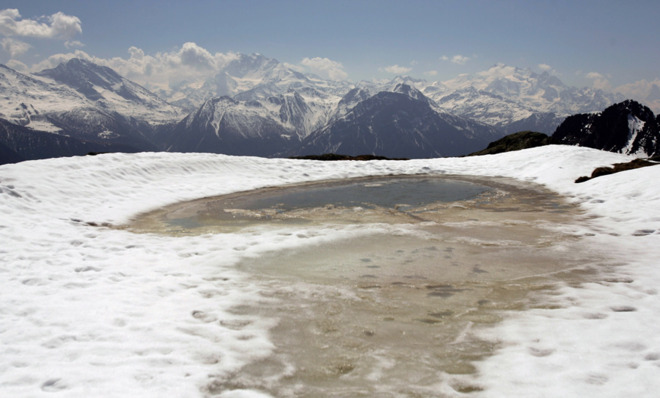How the market — not government — could save the Earth from climate change
Don't believe those conspiracy theorists who say global warming is a socialist cover-up

A free daily email with the biggest news stories of the day – and the best features from TheWeek.com
You are now subscribed
Your newsletter sign-up was successful
Last month, I wrote a piece discussing the fact that belief in climate change shifts with the weather — the hotter the weather, the more people believe in it, and vice versa during colder spells. One of the most striking accusations delivered in the comments section was that global warming is a hoax perpetuated to promote socialism and big government.
This is an exceptionally stupid idea. But before you write it off as the ravings of a troll, consider the fact that a healthy number of Americans still continue to doubt the existence of climate change. Combine that with a hyperpartisan atmosphere, and you can see why some would incorporate fears of government overreach in their attempts to deny global warming.
But the skeptics and cranks have it all backwards: It's not the government that is leading the fight against climate change; it's the free market.
The Week
Escape your echo chamber. Get the facts behind the news, plus analysis from multiple perspectives.

Sign up for The Week's Free Newsletters
From our morning news briefing to a weekly Good News Newsletter, get the best of The Week delivered directly to your inbox.
From our morning news briefing to a weekly Good News Newsletter, get the best of The Week delivered directly to your inbox.
First things first: To the overwhelming majority of climate scientists, man-made climate change is a fact. This consensus does not stem from scientists moving in a herd, the inverse of Vatican theologians denying Galileo’s attempt to show that the Earth revolves around the Sun. The consensus exists because it is supported by vast quantities of empirical evidence.
We know that the Earth has warmed significantly over the last century, and that human emissions have simultaneously increased atmospheric carbon dioxide by 40 percent over pre-industrial levels. We know that global temperatures and carbon dioxide levels have been very strongly correlated over the last few hundred thousand years. We have clear evidence that global sea levels have risen, that the oceans are warming, that ice sheets are shrinking globally, that a majority of glaciers are shrinking, and that the oceans are becoming more acidic.
We understand the mechanism — the greenhouse effect — by which more carbon dioxide causes warming. And we know that nine of the warmest ten years have all occurred since 1998, the year that deniers mistakenly claim warming stopped. All of these things have been independently corroborated in multiple studies by many scientists over the world.
These are the facts of climate change. What to do about climate change is an entirely separate matter — this is where questions of science end, and where questions of politics and economics begin.
A free daily email with the biggest news stories of the day – and the best features from TheWeek.com
Perhaps there are socialists out there who want to use climate change to push a socialist agenda. And certainly many other people — not just socialists — advocate governmental or international control to prevent emissions. But this is a controversial approach, and not necessarily even a very effective one. Emerging economies understandably do not want limits placed on their development by richer countries that benefited immensely from fossil fuels. And industrialized nations like the U.S. do not want to curb their economic growth in the interests of fighting climate change, either.
As a result, most nations, including the United States, have failed to meet their emissions reduction targets under the Kyoto Protocol. For all of the global conferences that come and go, reaching an effective agreement that the whole world can stick by will always be a long shot.
Indeed, with renewable energy prices falling so rapidly, and the cost of fossil fuel extraction on a long-term rising trend, it is beginning to seem likelier that reductions in carbon emissions will come via people switching to renewable energy, as opposed to some centrally planned scheme to tax or regulate people out of using fossil fuels.
There are other possibilities that may fight climate change, such as developing and deploying artificial carbon capture and storage technology, and planting trees that absorb carbon from the atmosphere. And there is good reason to believe that many businesses — for instance, insurance firms worried about extreme weather, technology companies looking for cheap, green, and reliable electricity, or oil companies looking to branch out into the fast-growing renewables sector — will be prepared to fund the development of climate change mitigation and clean energy technology.
The conferences to find international agreements on climate change will continue. But the real progress on the issue is coming from the market, where renewable energy continues to get cheaper and cheaper.
So there is absolutely no reason to believe that fighting climate change is equivalent to a massive expansion of government control, let alone socialism. Sorry, haters.
John Aziz is the economics and business correspondent at TheWeek.com. He is also an associate editor at Pieria.co.uk. Previously his work has appeared on Business Insider, Zero Hedge, and Noahpinion.
-
 Political cartoons for February 21
Political cartoons for February 21Cartoons Saturday’s political cartoons include consequences, secrets, and more
-
 Crisis in Cuba: a ‘golden opportunity’ for Washington?
Crisis in Cuba: a ‘golden opportunity’ for Washington?Talking Point The Trump administration is applying the pressure, and with Latin America swinging to the right, Havana is becoming more ‘politically isolated’
-
 5 thoroughly redacted cartoons about Pam Bondi protecting predators
5 thoroughly redacted cartoons about Pam Bondi protecting predatorsCartoons Artists take on the real victim, types of protection, and more